FP239 – The Murder Plague: Responsibility, Part 2 of 3
Welcome to Flash Pulp, episode two hundred and thirty-nine.
![]() Tonight we present, The Murder Plague: Responsibility, Part 2 of 3.
Tonight we present, The Murder Plague: Responsibility, Part 2 of 3.
(Part 1 – Part 2 – Part 3)
(RSS / iTunes)
This week’s episodes are brought to you by Pendragon Variety.
Flash Pulp is an experiment in broadcasting fresh pulp stories in the modern age – three to ten minutes of fiction brought to you Monday, Wednesday and Friday evenings.
Tonight, Harm Carter finds himself the hostage of a scheming lawman.
The Murder Plague: Responsibility, Part 2 of 3
Written by J.R.D. Skinner
Art and Narration by Opopanax
and Audio produced by Jessica May
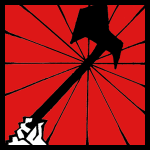 “You, sir, have the intelligence of a lobotomized chimp with a penchant for model glue,” I informed Mr Baldy.
“You, sir, have the intelligence of a lobotomized chimp with a penchant for model glue,” I informed Mr Baldy.
I knew it would have made little difference if he hadn’t attempted to flee our crashed vehicle, but I was losing patience.
“Weaver hasn’t shot us yet,” he replied.
Although he his argument was somewhat valid, we would find out why we’d been spared soon enough.
With a wiggle of his department-issued shotgun, Sheriff Weaver said, “you will stay close together, and you will stay directly in front of me. I’m very familiar with the route: The only danger is in disobeying orders.”
I knew the statement to be as solid as a dead man’s handshake, but I kept my silence. It takes a madman to think he has any sort of existence, within the cloud of the murder plague, under control.
Instead I asked after the child. A quick inspection of her arm had convinced me that it was, at the least, badly sprained. While there was no bone protruding, I wouldn’t have been surprised to learn it was broken.
She did her best to remain calm and quiet, but, even when she wasn’t wailing, there was moisture in her eyes, and her chin suffered bouts of trembling.
“There are appropriate medical supplies at the apartment,” was Weaver’s reply.
At that point I spun on my heel and took in the trees and open fields that surrounded us.
As was so often the case in my days of uniform modeling for Uncle Sam, there was nothing for it but to start marching.
Baldy and I carried the toddler, so that we might make a decent pace. It was the division of labour which brought on problems.
My time toting the girl was largely spent wandering through memories of Becky at the same age. On a warm August morning, when she was four, Rebbecca came to show me a “pretty bug” she’d found while roaming the backyard. The bee had landed on her palm, and, as I moved to shoo it away, Becky defensively closed her hand. She’d spent the rest of the day forcing me to search cupboards, closets, and couch cushions, for any lurking, stinging beasts.
It was one of the few occasions in her life that she asked me for help.
As Baldy undertook his turn, my time was largely spent listening to his complaining. I believe he was attempting to bargain with the crazed sheriff, but it sounded like a litany of reasons he was living in an unjust universe.
My bit finger throbbed, my legs ached, and my back was sore: I finally interrupted my weasel-y companion’s diatribe.
“If this were a fair world, I wouldn’t find myself on a death march with the fellow who couldn’t be bothered to trim his hedges for the nearly-a-decade that he was my neighbour.”
Baldy’s rodent jaw snapped shut, but only briefly.
“Who the hell are you to talk about caretaking?” he replied, “I couldn’t help but notice how piss-poor a job you did of raising your daughter after your wife died. They had to hire an extra recycling guy just to haul off your wine bottles, and you’re supposed to be a god damn war hero. Screw you and your well-groomed yard, where’s your lawn, or your daughter, now?”
“Where ever she is, I raised her to take care of herself, and I’m sure she’s above ground – can you say the same?”
His cheeks reddened, and I knew I was right in my long-held guess that he’d been forced to dig shallow graves for his family.
It was a rough-tongued bit of work, but I wasn’t feeling entirely myself.
Weaver interrupted our exchange.
“All walk, no talk,” he said.
The road continued, and the sky darkened. The passing houses became suburbs, and the suburbs eventually sprouted residential towers. None of the streets were lit, and many of the glass-fronted plaza stores had been opened to the world with bricks, and yet we saw no one living.
We did skirt several abandoned crime scenes – a pair of nyloned legs protruded from the bed of a red pick up truck, a herculean man had been pinned to a beige bungalow with a fireplace poker, and a teen rotted in the parking lot of the McDonald’s from which she’d stumbled after apparently being poisoned. At least, that’s my guess, as the weather had done little to wash away the slug-trail of vomit behind her.
As dawn broke, we were firmly within the borders of Capital City.
“We must be close to the blockade?” I asked.
I should mention that, before exiting the truck, I’d considered attempting to hide our recently acquired GPS in a satchel, but, in the end, I wasn’t willing to risk Weaver confiscating our escape route. I’d stashed it beneath my seat.
Still, I’d spent plenty of driving hours staring at the blinking box, and I was sure of my estimate.
“The river is the quarantine line,” replied the lawman.
I didn’t yet recognize the back alleys and side-streets through which he lead us, and, I admit, for a moment I thought that perhaps Weaver really was headed out of the catastrophe.
My hopes were done in when we stopped at the gaping doors of a stout apartment building’s lobby. The balconies above had wept rust onto the cement walls, and wilted plants stood before many sliding entrances.
I wondered how many corpses were decaying within, and how many units might be rigged with bullets or bombs. I had no interest in entering, though I felt increasingly sure that was our captor’s aim.
Baldy had been carrying our bundle, and I turned to take her. If we were going in, it would better her odds.
That’s when I heard it.
Have you ever witnessed an armoured vehicle in action?
It’s not like on the big screen, where a tank can burst through a wall with little warning. They’ve come a long way since my days of tin-can touring, but there’s a grinding approach to that much metal that they’ll never make silent.
The gray people-carrier didn’t seem to care for concealment, anyhow, as it pulled into view. Even three blocks down, I could see the rotating sweeps of its roof-mounted peashooter.
“I’m a god damn genius,” said Weaver. “I knew those sumbitches had drones. They got out here P.D.Q., though, didn’t they.”
As the steel beetle halved the distance between us, the sheriff sprinted into the depths of the lobby.
Flash Pulp is presented by http://skinner.fm, and is released under the Canadian Creative Commons Attribution-Noncommercial 2.5 License.
Freesound.org credits:
Text and audio commentaries can be sent to skinner@skinner.fm, or the voicemail line at (206) 338-2792 – but be aware that it may appear in the FlashCast.
– and thanks to you, for reading. If you enjoyed the story, tell your friends.
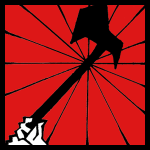 Having a toddler in the cab of the truck considerably lightened our moods – although, I will admit, it may have also been the fact that her lack of desire to murder us was proof that there was an antidote for the sickness.
Having a toddler in the cab of the truck considerably lightened our moods – although, I will admit, it may have also been the fact that her lack of desire to murder us was proof that there was an antidote for the sickness.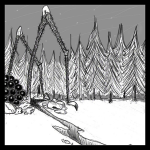 “I’ve never driven like that in my life,” was all he could deliver between sobs.
“I’ve never driven like that in my life,” was all he could deliver between sobs.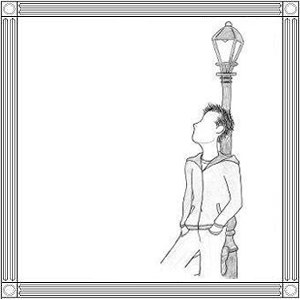 Mulligan Smith was lost in a sea of cheap jackets and bulky winter coats.
Mulligan Smith was lost in a sea of cheap jackets and bulky winter coats.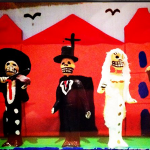 Daytime traffic had long drained away, and the Konitzer Bridge, a span over Capital City’s Lethe River, stood empty but for the trio of late night pedestrians beneath its gray iron-struts.
Daytime traffic had long drained away, and the Konitzer Bridge, a span over Capital City’s Lethe River, stood empty but for the trio of late night pedestrians beneath its gray iron-struts.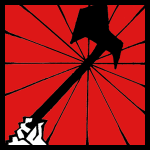 Well before dusk, and on a stretch of highway sided by nothing more aggressive than withered soy plants, I brought the truck to a halt. After Linwood’s ranting demise, it was tough not to feel as if an infected paranoid might leap up from the muck, and, convinced we were at hand to steal his coveted dirt, come charging on with an assault rifle, or a sword, or even an ill-intentioned dull razor.
Well before dusk, and on a stretch of highway sided by nothing more aggressive than withered soy plants, I brought the truck to a halt. After Linwood’s ranting demise, it was tough not to feel as if an infected paranoid might leap up from the muck, and, convinced we were at hand to steal his coveted dirt, come charging on with an assault rifle, or a sword, or even an ill-intentioned dull razor.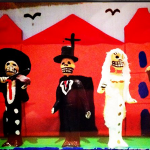 Victoria had been awoken by the conversation in her sleeping chamber, and was now on her tip toes at the edge of the portable crib. Her stubby-fingered fist gripped the bars tightly as she watched Coffin finish his discussion with the dead man.
Victoria had been awoken by the conversation in her sleeping chamber, and was now on her tip toes at the edge of the portable crib. Her stubby-fingered fist gripped the bars tightly as she watched Coffin finish his discussion with the dead man.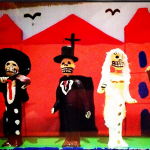 It was an unpleasant experience, but the Landreaus had been convinced that simply waiting was the best option for cleaning up the arcane shower of blood that had coated every surface of their dishevelled guest room, and Will had to agree.
It was an unpleasant experience, but the Landreaus had been convinced that simply waiting was the best option for cleaning up the arcane shower of blood that had coated every surface of their dishevelled guest room, and Will had to agree.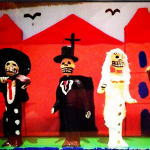 Despite the snow that fell silently around them, Will Coffin, and his roommate, sat idly on the gray bench that fronted the Eats’N’Treats.
Despite the snow that fell silently around them, Will Coffin, and his roommate, sat idly on the gray bench that fronted the Eats’N’Treats.